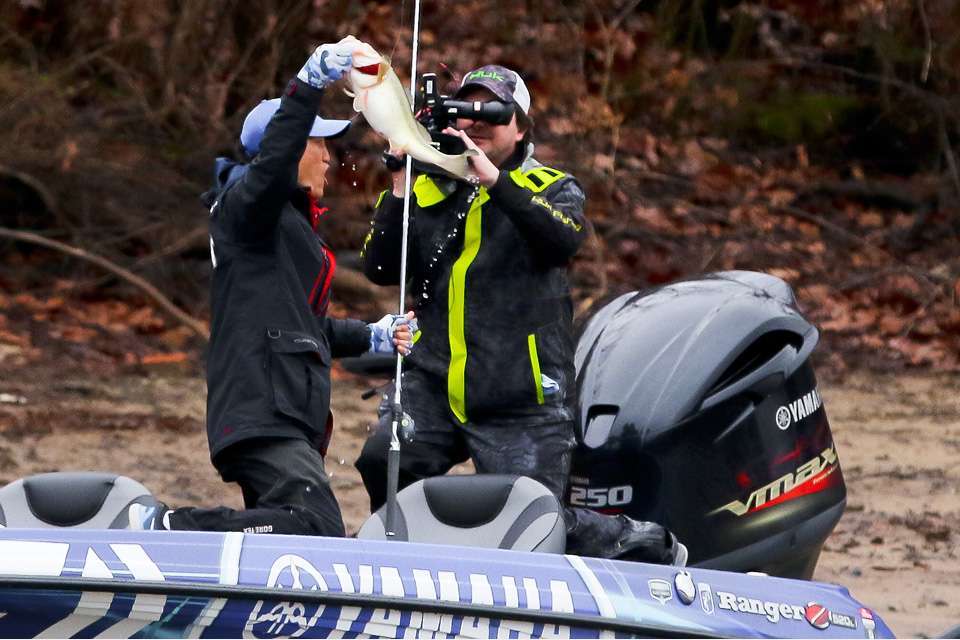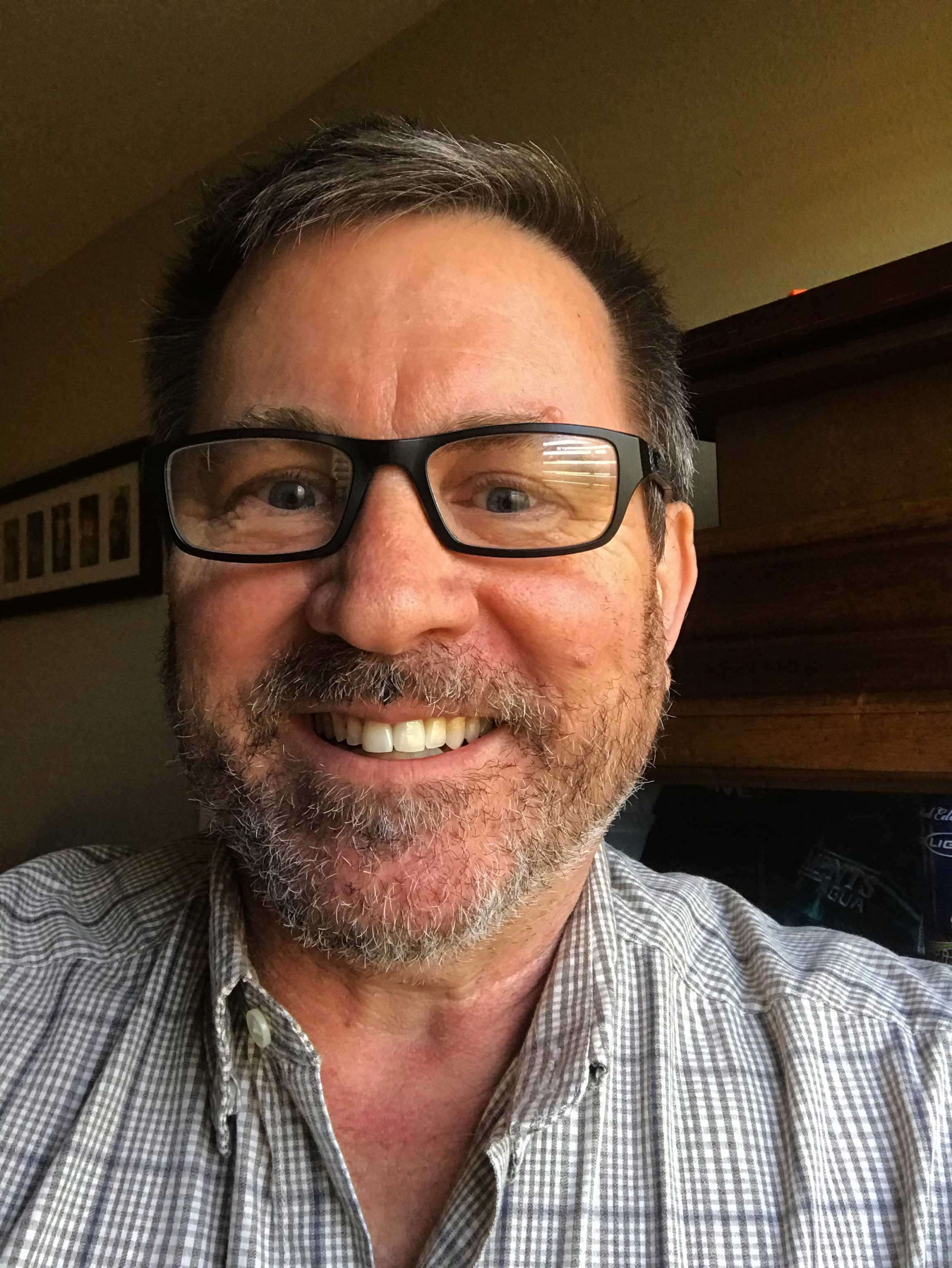
Although too humble to acknowledge accolades, Takahiro Omori certainly deserves to be called “The Great Japanese Fisherman.”
While many in Japan – even his family – see fishing as “a hobby,” Omori, 47, has compiled an impressive resume and quietly become the most successful professional angler who’s ever immigrated to America. With his victory Sunday in the Bassmaster Elite at Lake Martin presented by Econo Lodge, Omori climbed another step into the upper echelons of competitive bass angling.
It was the Toyko-born angler’s seventh Bassmaster victory, and the $100,000 prize made him the 15th person to eclipse $2 million in B.A.S.S. earnings. He downplayed both feats.
“I started in 1992, so it’s been 26 years on the Bassmaster tour,” he said. “If I start fishing 10 years ago, I can make much more money.
“I fish more tournaments than most of the guys. Out of 110, only five or six guys have fished more than me.”
Since his first event in 1991, Omori has competed in 288 B.A.S.S. tournaments, cashing checks in 149 (C50 rate of 52 percent). He’s qualified for 12 Classics, and he won the 2004 championship on Lake Wylie in South Carolina. It’s where a last-minute move to the winning fish spawned his famous catchphrase – “I knew it” – that’s been imitated by fans and anglers countless times.
Omori repeated it Sunday when asked by tournament emcee Dave Mercer if he had a feeling his spot would hold up. By nature and nationality, Omori doesn’t brag, much less give himself credit.
“I don’t,” he said. “I have to think that way to keep me humble, to keep me working hard. My point is, I never give credit for my success. That’s part who I am.”
It’s also part of Japanese culture, he said.
“Japanese work hard. It’s how I grew up. It’s not American way … they would have a huge house, nicest car, big truck,” said Omori, who lives in the same 2,000-square foot home he bought near Lake Fork in 2001.
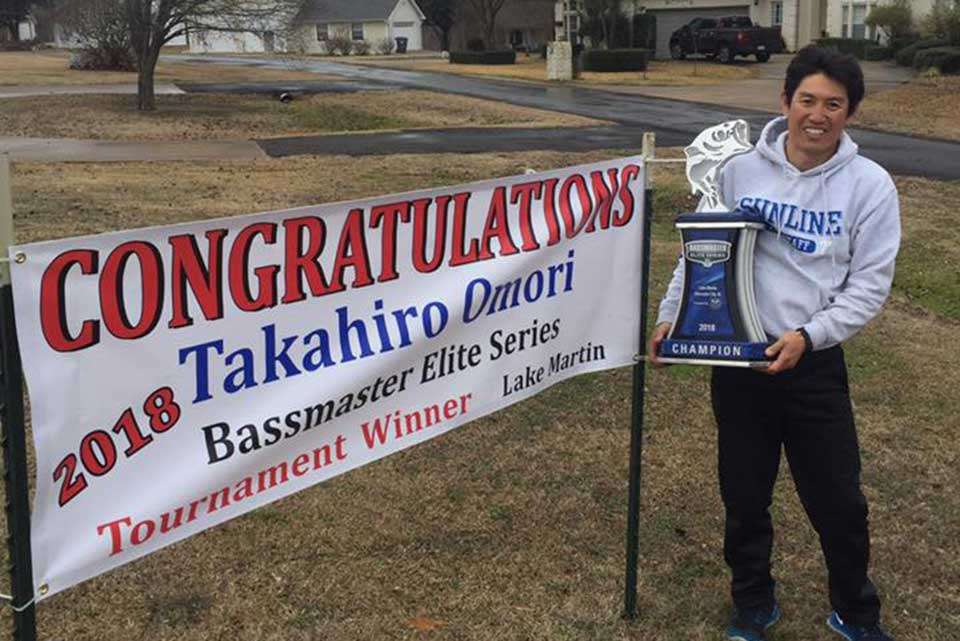
Living in a tent on an island
Omori was born in Toyko on Sept. 4, 1970, and his family moved to the country when he was young. He grew up fishing for a variety of saltwater species with his father.
“My dad’s hobby is fishing, but he never bass fished,” Omori said. “When I was about 9, I went fishing with my friends on a pond and caught my first bass.”
The bass bug bit him. Most every weekend, Omori rode his bike to fish an area pond with friends, and he began to soak up everything bass. Basser magazine helped introduce him to the sport, and it was meeting Gary Yamamoto at a fishing tournament in 1985 that put him on his path.
“I was in high school and started fishing those junior tournaments, and that’s where I met him,” Omori said. “I told him I wanted to become a pro fisherman. He told me, if you want to make living in bass fishing, you have to come to America.”
Omori’s father wasn’t going for his plan to fish for a living. Most parents at that time, in Japan and even the United States, did not consider bass fishing a career, and most didn’t want their children to pursue it.
“I guess they kinda gave up on me. It’s just the typical parents – fishing is a hobby,” Omori said. “I had a sister and brother. They went to good university. The best way to have a good life is to go to the best college, so you can get the best jobs.
“I was totally against it. I wanted to be a pro fisherman. I don’t care about making a lot of money, or living in a small house.”
If he wouldn’t attend college, Omori’s father wouldn’t allow Tak to stay in their home. Omori ended up living in a tent on a lake island.
“After I left my parents’ house, I had no place to go, but I wanted to keep fishing,” he said. “That was right after I graduated high school. I never went to college. I was fishing every day, living on this small island.”
On his website, Omori writes that he worked on his craft while living in the middle of Lake Kawaguchi, where much of the surrounding land is developed. He worked a variety of jobs, such as bell hop, dishwasher and waiter, to survive.
“I have a keen passion about fishing, outdoors – I don’t hunt – I like to explore Mother Nature and I have huge passion for competition, so that’s why I fish tournaments to be No. 1,” he said.
Coming to America was bold move
There’s literally been millions of immigrants who came to America because they were told the streets were lined with gold. Omori came for the green, as in the color of largemouth bass. He said he saved about $2,000 for the trip over and arrived in Texas with a tacklebox, a couple fishing rods and a suitcase of clothes.
A stranger in a strange land, Omori knew only one person and didn’t speak much English. He began fishing events in 1992 as a co-angler to learn the ropes. He did make a 15-year plan, which included qualifying for the Bassmaster Classic.
The first year had to be discouraging. He was 304th on Sam Rayburn in his first event, and he didn’t top 256th in his next three. In 1993, in his fifth tournament, he cashed his first B.A.S.S. check, finishing eighth on Lake Eufaula to earn $3,800.
That same year, Japan’s Norio Tanabe won on Kentucky Lake, becoming the first international angler to win a B.A.S.S. event. It was another three years before Omori won his first Bassmaster, the Missouri Central Invitational on Lake of the Ozarks. His payday was $14,000.
Some top finishes in 2001 helped Omori qualify for his first Classic, where he took 26th on the Louisiana Delta. That finish didn’t matter as much as who attended – his parents.
“I took my dad to my first Classic I made in 2001,” Omori said. “Then three days later, when he was back in Japan, he died of a heart attack. He saw me fish my first ever Classic.”
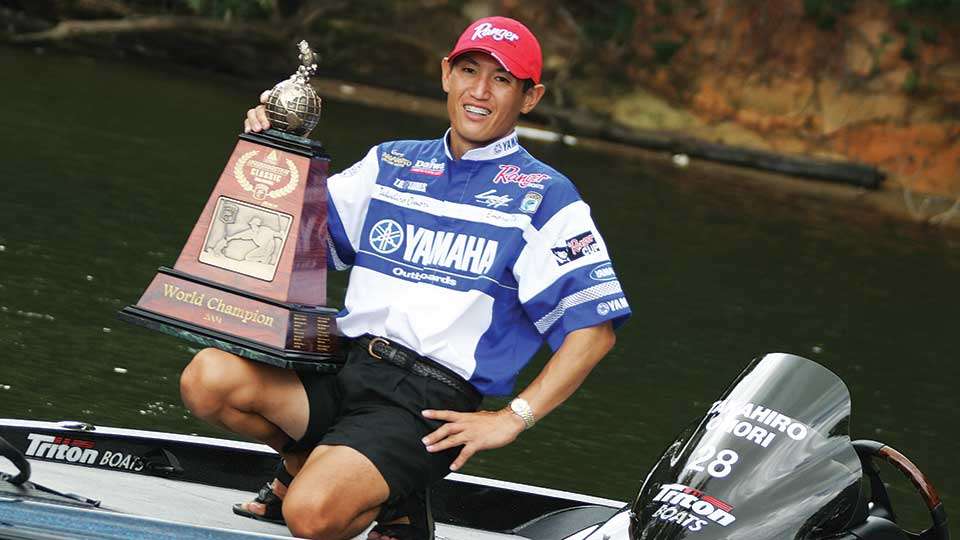
Yet he missed seeing his son’s greatest success, claiming the Classic title on Lake Wylie in 2004. Omori had quite the memorable victory as his switch to a crankbait helped him catch two bass in the final five minutes to win the $200,000 top prize.
“This is the best day of my life,” Omori said at the time. “I’ve waited 18 years for my dream to come true – since I was 15. The money is great, but it’s not about the money. It’s the trophy, really. It’s awesome.
“I had lost two 5-pounders and I thought it cost me the Classic. But I never give up. With fishing, you never know what is going to happen.”
Omori became the first – and remains the only – citizen of a foreign country to win a Bassmaster Classic
Tak joked ‘now I can retire’
On stage Sunday with Mercer and his second Elite trophy (and second win on Lake Martin), Omori joked that with his $100,000 payday, he could retire.
“That was my joke. Nobody can keep winning forever. I can’t care who you are, you can’t perform forever,” he said. “At some point, you’re going down. I want to perform at the highest level. If I don’t and start losing money, I’ll have to retire.”
When he does, it’s likely he will go out as the top angler from Japan. While Tanabe broke the ice, he only won one event. Ben Matsubu, Kotaro Kiriyama and Morizo Shimizu each have Elite victories. Kiriyama, who last fished the Elites in 2016, is less than $14,000 from $1 million in earnings.
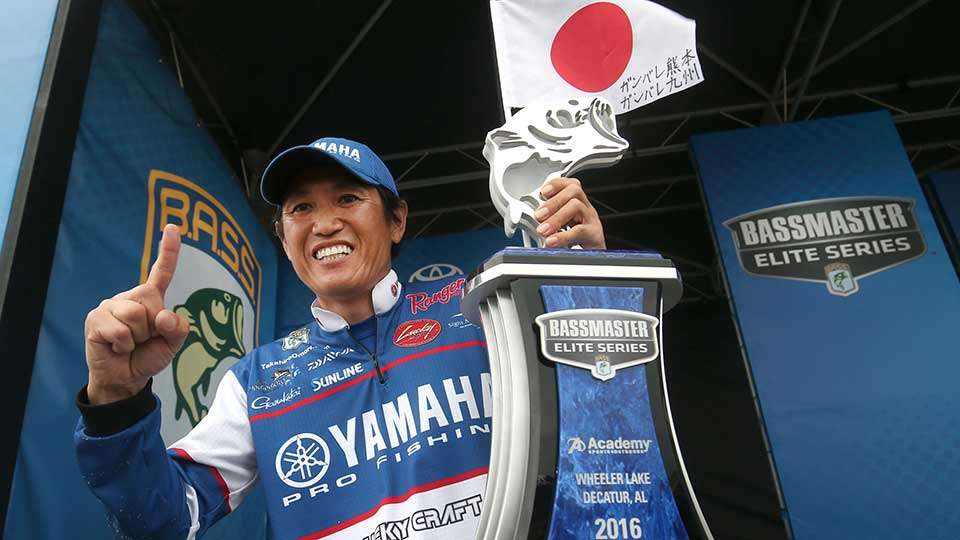
But the closest Japanese national to Omori in competitive fishing might be new Elite Shin Fukae, who had great success on the FLW Tour with three wins and nearly $1.5 million in earnings. He’s also won a Bass Pro Shops Bassmaster Open.
Seigo Saito, a photographer for B.A.S.S. who’s originally from Japan and now lives in Los Angeles, said Shimizu is probably the most popular in their home country, but it’s because of his long running fishing show.
“Morizo has a show, fishes tournaments, and he’s trying to bring tournaments to Japan like there are here,” Saito said. “Tak is known by people there for tournament fishing.”
As well he should be. Only 20 other anglers have as many B.A.S.S. wins as Omori. His seventh title tied Omori for 13th all-time with Bill Dance, George Cochran, Ron Shuffield, Peter Thliveros, Mike Iaconelli, Tommy Biffle and Chris Lane.
Omori doesn’t put much stock in those numbers, even being the best from Japan.
“That’s going to be broken someday by somebody,” he said. “I don’t worry about it, records.”
There is still a goal in his 15-year plan he hasn’t reached – winning the Toyota Bassmaster Angler of the Year title. It was pointed out that Lake Martin gave him a pretty good start on 2018.
“But we have nine more tournaments to go … and you have to have a lot of points,” he said. “I’m not putting too much pressure on myself. I had a great, great start to year. I hope it keeps going.”
Maybe with an AOY title, and some explaining what it means, his mother will come around to realize he’s done very well in his chosen profession. Omori last visited his mother two years ago, staying in Japan for two months, but those trips are getting more difficult to arrange with fishing as well as working on his signature lines of gear.
“My mom kinda gets it now,” he said. “Most everybody (in Japan) thinks this is a hobby. Fishing still has a long way to go.”
While Omori prefers to keep his head down and work, he’s come a long way in the sport, far enough to earn the title of The Great Japanese Fisherman.
